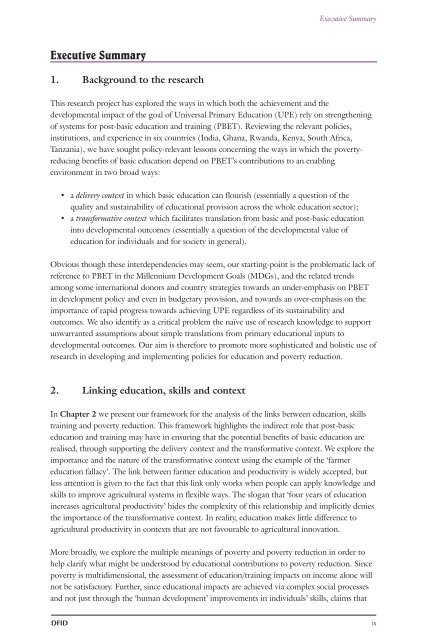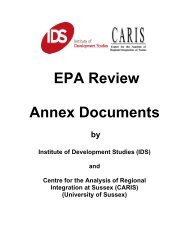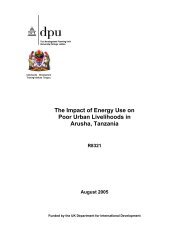Educating out of Poverty? A Synthesis Report on Ghana, India ... - DfID
Educating out of Poverty? A Synthesis Report on Ghana, India ... - DfID
Educating out of Poverty? A Synthesis Report on Ghana, India ... - DfID
You also want an ePaper? Increase the reach of your titles
YUMPU automatically turns print PDFs into web optimized ePapers that Google loves.
Executive Summary<br />
1. Background to the research<br />
Executive Summary<br />
This research project has explored the ways in which both the achievement and the<br />
developmental impact <str<strong>on</strong>g>of</str<strong>on</strong>g> the goal <str<strong>on</strong>g>of</str<strong>on</strong>g> Universal Primary Educati<strong>on</strong> (UPE) rely <strong>on</strong> strengthening<br />
<str<strong>on</strong>g>of</str<strong>on</strong>g> systems for post-basic educati<strong>on</strong> and training (PBET). Reviewing the relevant policies,<br />
instituti<strong>on</strong>s, and experience in six countries (<strong>India</strong>, <strong>Ghana</strong>, Rwanda, Kenya, S<str<strong>on</strong>g>out</str<strong>on</strong>g>h Africa,<br />
Tanzania), we have sought policy-relevant less<strong>on</strong>s c<strong>on</strong>cerning the ways in which the povertyreducing<br />
benefits <str<strong>on</strong>g>of</str<strong>on</strong>g> basic educati<strong>on</strong> depend <strong>on</strong> PBET’s c<strong>on</strong>tributi<strong>on</strong>s to an enabling<br />
envir<strong>on</strong>ment in two broad ways:<br />
• a delivery c<strong>on</strong>text in which basic educati<strong>on</strong> can flourish (essentially a questi<strong>on</strong> <str<strong>on</strong>g>of</str<strong>on</strong>g> the<br />
quality and sustainability <str<strong>on</strong>g>of</str<strong>on</strong>g> educati<strong>on</strong>al provisi<strong>on</strong> across the whole educati<strong>on</strong> sector);<br />
• a transformative c<strong>on</strong>text which facilitates translati<strong>on</strong> from basic and post-basic educati<strong>on</strong><br />
into developmental <str<strong>on</strong>g>out</str<strong>on</strong>g>comes (essentially a questi<strong>on</strong> <str<strong>on</strong>g>of</str<strong>on</strong>g> the developmental value <str<strong>on</strong>g>of</str<strong>on</strong>g><br />
educati<strong>on</strong> for individuals and for society in general).<br />
Obvious though these interdependencies may seem, our starting-point is the problematic lack <str<strong>on</strong>g>of</str<strong>on</strong>g><br />
reference to PBET in the Millennium Development Goals (MDGs), and the related trends<br />
am<strong>on</strong>g some internati<strong>on</strong>al d<strong>on</strong>ors and country strategies towards an under-emphasis <strong>on</strong> PBET<br />
in development policy and even in budgetary provisi<strong>on</strong>, and towards an over-emphasis <strong>on</strong> the<br />
importance <str<strong>on</strong>g>of</str<strong>on</strong>g> rapid progress towards achieving UPE regardless <str<strong>on</strong>g>of</str<strong>on</strong>g> its sustainability and<br />
<str<strong>on</strong>g>out</str<strong>on</strong>g>comes. We also identify as a critical problem the naïve use <str<strong>on</strong>g>of</str<strong>on</strong>g> research knowledge to support<br />
unwarranted assumpti<strong>on</strong>s ab<str<strong>on</strong>g>out</str<strong>on</strong>g> simple translati<strong>on</strong>s from primary educati<strong>on</strong>al inputs to<br />
developmental <str<strong>on</strong>g>out</str<strong>on</strong>g>comes. Our aim is therefore to promote more sophisticated and holistic use <str<strong>on</strong>g>of</str<strong>on</strong>g><br />
research in developing and implementing policies for educati<strong>on</strong> and poverty reducti<strong>on</strong>.<br />
2. Linking educati<strong>on</strong>, skills and c<strong>on</strong>text<br />
In Chapter 2 we present our framework for the analysis <str<strong>on</strong>g>of</str<strong>on</strong>g> the links between educati<strong>on</strong>, skills<br />
training and poverty reducti<strong>on</strong>. This framework highlights the indirect role that post-basic<br />
educati<strong>on</strong> and training may have in ensuring that the potential benefits <str<strong>on</strong>g>of</str<strong>on</strong>g> basic educati<strong>on</strong> are<br />
realised, through supporting the delivery c<strong>on</strong>text and the transformative c<strong>on</strong>text. We explore the<br />
importance and the nature <str<strong>on</strong>g>of</str<strong>on</strong>g> the transformative c<strong>on</strong>text using the example <str<strong>on</strong>g>of</str<strong>on</strong>g> the ‘farmer<br />
educati<strong>on</strong> fallacy’. The link between farmer educati<strong>on</strong> and productivity is widely accepted, but<br />
less attenti<strong>on</strong> is given to the fact that this link <strong>on</strong>ly works when people can apply knowledge and<br />
skills to improve agricultural systems in flexible ways. The slogan that ‘four years <str<strong>on</strong>g>of</str<strong>on</strong>g> educati<strong>on</strong><br />
increases agricultural productivity’ hides the complexity <str<strong>on</strong>g>of</str<strong>on</strong>g> this relati<strong>on</strong>ship and implicitly denies<br />
the importance <str<strong>on</strong>g>of</str<strong>on</strong>g> the transformative c<strong>on</strong>text. In reality, educati<strong>on</strong> makes little difference to<br />
agricultural productivity in c<strong>on</strong>texts that are not favourable to agricultural innovati<strong>on</strong>.<br />
More broadly, we explore the multiple meanings <str<strong>on</strong>g>of</str<strong>on</strong>g> poverty and poverty reducti<strong>on</strong> in order to<br />
help clarify what might be understood by educati<strong>on</strong>al c<strong>on</strong>tributi<strong>on</strong>s to poverty reducti<strong>on</strong>. Since<br />
poverty is multidimensi<strong>on</strong>al, the assessment <str<strong>on</strong>g>of</str<strong>on</strong>g> educati<strong>on</strong>/training impacts <strong>on</strong> income al<strong>on</strong>e will<br />
not be satisfactory. Further, since educati<strong>on</strong>al impacts are achieved via complex social processes<br />
and not just through the ‘human development’ improvements in individuals’ skills, claims that<br />
DFID ix

















